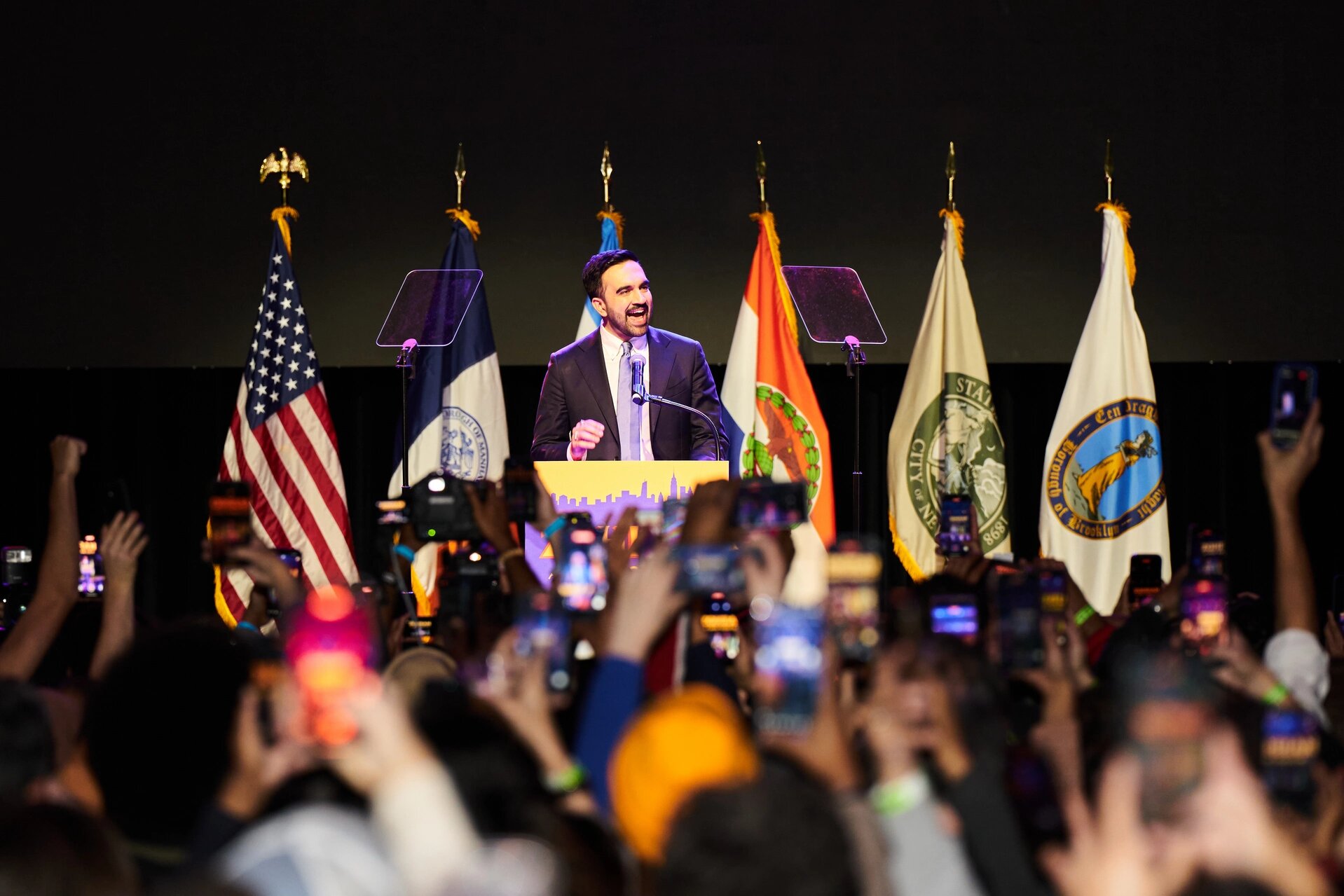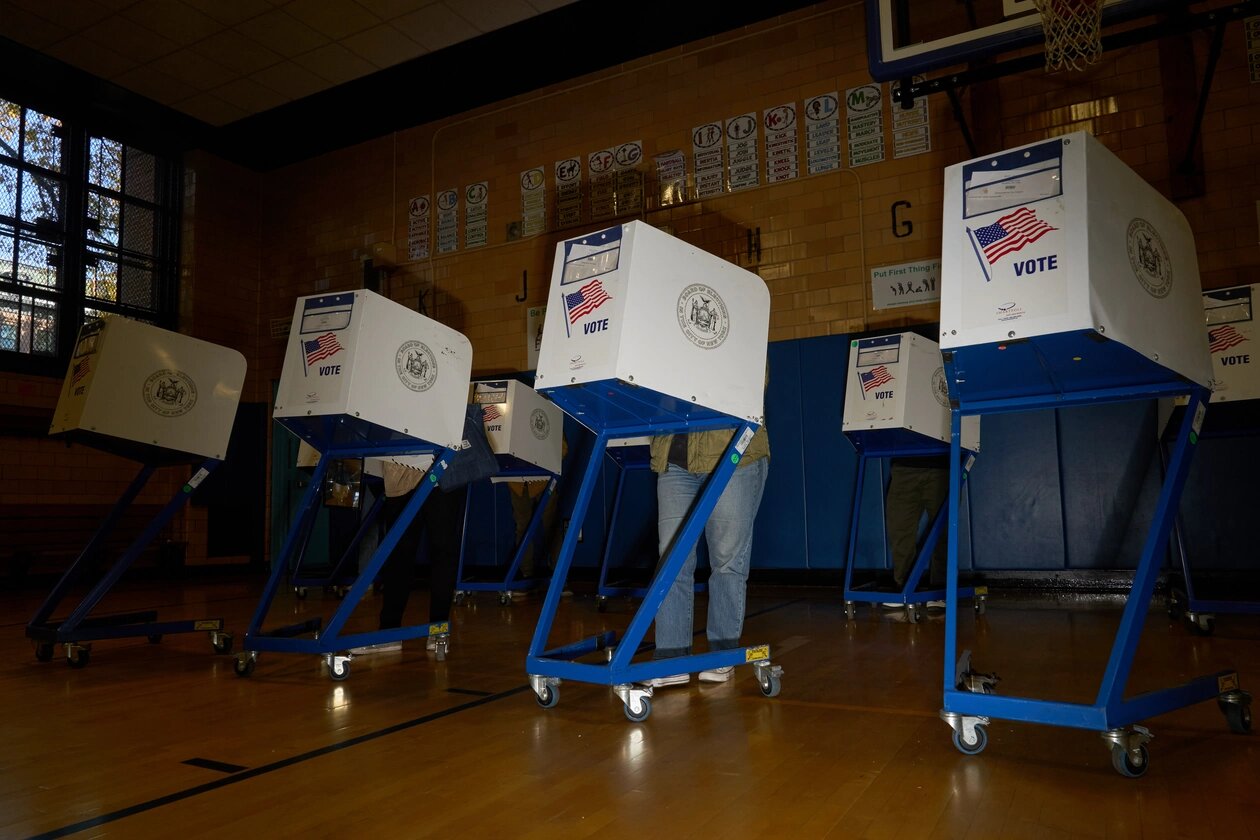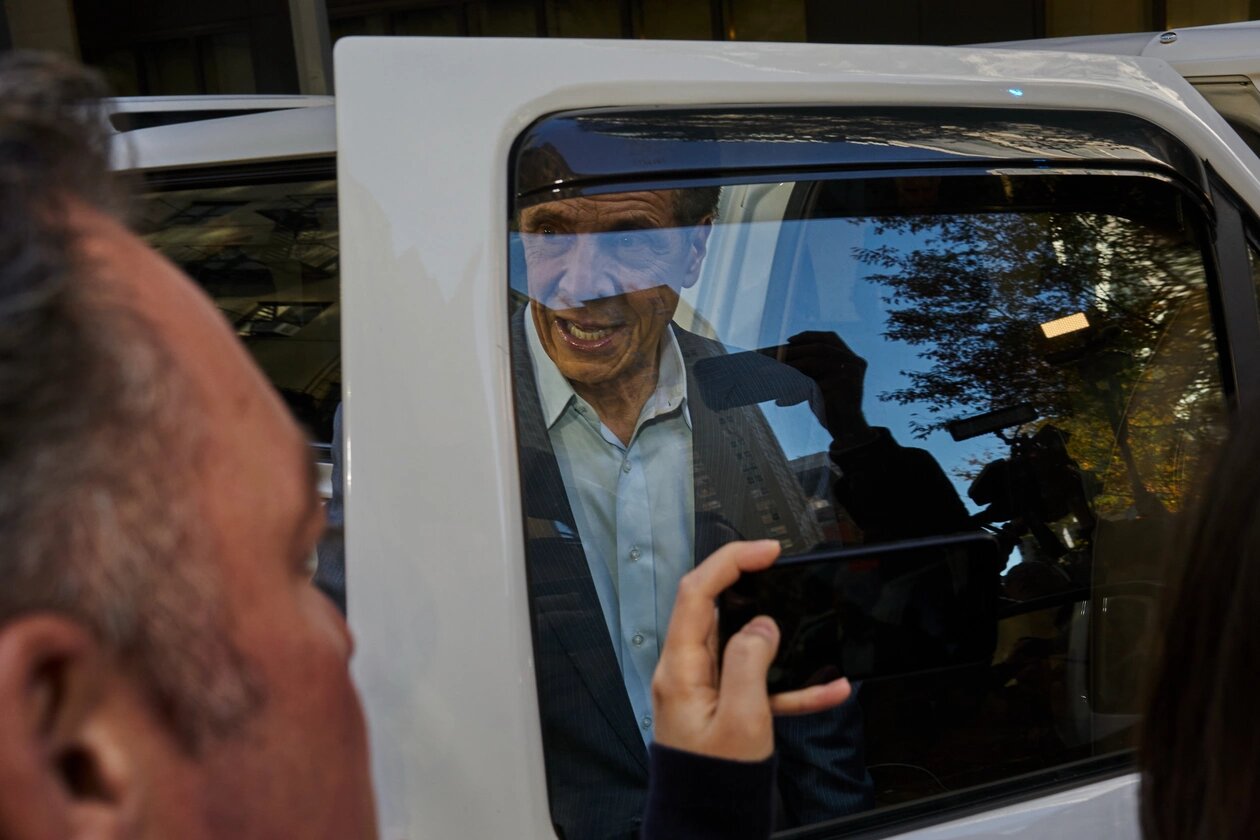The democratic socialist vanquished Andrew Cuomo in a contest being closely watched by national Democrats, Republicans and the White House.

NEW YORK — Zohran Mamdani capped a sharp-elbowed campaign for New York City mayor Tuesday night with a historic win, cementing the democratic socialist as both a rising star and a divisive figure in the Democratic Party.
For Republicans and President Donald Trump, the results hand-deliver an ideal foil heading into midterm elections next year as they seek to paint their adversaries as out-of-touch leftists.
With nearly all ballots counted, Mamdani had netted just over 50 percent of the vote, according to data from the New York City Board of Elections. That was enough to vanquish former Gov. Andrew Cuomo, who lost to Mamdani in the June Democratic primary and ran an increasingly bitter and negative general election campaign as an independent that won the support of Trump in the final hours of the race.
Come Jan. 1, Mamdani will become the city’s first Muslim mayor and the second in modern history after David Dinkins to identify as a democratic socialist. He will have the support of an army of dedicated volunteers, major labor unions and most of the state’s Democratic Party as he seeks to implement an ambitious agenda requiring major concessions from Albany.
But deep fault lines exposed during the race are likely to persist: The victor’s campaign was buoyed by left-leaning, younger voters keen on his message of affordability. Republicans, moderates, older Democrats and those wary of Mamdani’s stances on Israel, meanwhile, supported Cuomo. How the mayor-elect will navigate those divisions while fending off an expected incursion from Trump and delivering on lofty campaign promises will become a defining feature of his tenure.

Those challenges were far from top of mind as Mamdani took the stage at a Brooklyn concert venue to a jubilant crowd.
“Friends, we have toppled a political dynasty,” Mamdani said to thunderous applause.
The mayor-elect focused much of his victory speech on the needs of New Yorkers working in lower wage jobs whom he pledged would see more assistance from his City Hall.
“Fingers bruised from lifting boxes on the warehouse floor, palms calloused from delivery by handle bars, knuckles scarred with kitchen burns,” Mamdani said. “These are not hands that have been allowed to hold power, and yet, over the last 12 months, you have dared to reach for something greater. Tonight, against all odds, we have grasped it.”
Mamdani thanked his supporters and campaign team while repeatedly trolling Cuomo — at one point he quoted the former governor’s father, Mario Cuomo — while again accusing his adversary’s campaign of devolving into Islamophobia.
“While we cast our ballots alone, we chose hope together,” Mamdani said. “Hope over tyranny, hope over big money and small ideas, hope over despair.”
The democratic socialist characterized his election as a path to defeating Trump, who he called a despot.
“Donald Trump, since I know you’re watching I have four words for you: Turn the volume up,” Mamdani said as the crowd roared.
And he made the case his ascension charted a path for Democrats to retake political power from the GOP.
“If tonight teaches us anything, it is that convention has held us back,” he said. “We have bowed at the altar of caution, and we have paid a mighty price. Too many working people cannot recognize themselves in our party. And too many among us have turned to the right for answers to why they have been left behind.”
Minutes earlier, Cuomo appeared onstage with his daughters at a downcast election party in Midtown Manhattan to concede to the democratic socialist for the second time in less than five months.
“This campaign was to contest the philosophies that are shaping the Democratic Party, the future of this city and the future of this country,” he told supporters. “And this coalition transcended normal partisan politics. It brought together Democrats and Republicans and independents, joined by the simple fact that their first allegiance is as citizens of New York City.”
Cuomo noted that almost half of New Yorkers did not vote Mamdani and stressed the need for public safety and combating antisemitism. And he admonished the crowd when supporters booed at the mention of Mamdani’s name.
Many at Cuomo headquarters blamed GOP nominee Curtis Sliwa for playing spoiler, but the latest vote count found that even if Sliwa would have heeded near-constant calls to drop out of the race over the last several weeks, it would not have been enough to propel Cuomo to a win.
Adams, in a video posted to social media, congratulated Mamdani and said his team would be preparing materials to help the mayor elect take the helm in January.
With victory in hand, the 34-year-old now has less than two months to assemble a transition committee and build out a government that will face enormous obstacles on Day One.
In addition to Trump’s threats to send in the National Guard and cut off funding to his former hometown, Mamdani will immediately have to advocate in Albany for many of his top priorities, free buses and universal child care chief among them. The democratic socialist has also mused about watering down mayoral control of the public school system — typically a major sticking point in negotiations with state lawmakers — but has provided little clarity on the details.
Mamdani won the support of most of the state’s Democratic establishment.
“A sleeping giant has arisen,” said State Attorney General Letitia James. “And the politics of fear and hate never work.”
Gov. Kathy Hochul and legislative leaders have similarly all endorsed Mamdani and expressed support for his plans. But whether they will want to pony up the billions of dollars necessary to pull them off is another question. Hochul has repeatedly said she will not raise taxes on high-income earners.
The mayor-elect also intends to create a Department of Community Safety, a new city division that will run point on mental health calls instead of relying solely on the NYPD. It will require a seismic restructuring of city government and will be an enormous undertaking. His team has already begun lobbying the City Council to lay the groundwork.
In addition, Mamdani has pledged to push the Rent Guidelines Board to freeze prices for rent-stabilized units next year — though the incumbent, Mayor Eric Adams, may use his waning power to change the makeup of the board and scramble Mamdani’s plans.
While New York City mayors have little power beyond the five boroughs, the race became a litmus test for divisions within the Democratic Party more broadly.
Mamdani’s ability to focus on kitchen table economics and excite young voters has been seen by left-leaning factions of the party as a path forward as Democrats grope for strategies to regain power in Washington, which is now controlled by Republicans.
But the reluctance of House Minority Leader Hakeem Jeffries to embrace Mamdani, Senate Minority Leader Chuck Schumer’s decision to sit out the race and Long Island Democratic Rep. Tom Suozzi’s endorsement of Cuomo indicate that many in the party still believe the democratic socialist is too far left to appeal to crucial moderate voters — and that his mayoralty will end up a net negative in contested House races next year.

Mamdani’s candidacy started out as a longshot.
In the fall of 2024, early polls had him in the single digits as the city’s political observers braced for what seemed inevitable at the time: Cuomo’s return to power after an ignominious resignation in the wake of sexual harassment allegations four years earlier — allegations he denies. Even Mamdani initially doubted the viability of his campaign. He and his allies viewed his run more as a vehicle to promote the New York City chapter of the Democratic Socialists of America, the hyper-organized leftist outfit that became a critical component of his victory.
By the spring, however, Mamdani began to emerge from a pack of hopefuls as the only candidate gaining ground on the former governor.
City Comptroller Brad Lander entered the race from a plum citywide perch and with deep roots in the city’s progressive movement. A calculated shift to the center, however, turned out to be a misstep, costing him much of his base on the left while earning him few new moderate supporters.
Lander’s predecessor, Scott Stringer, mounted a comeback attempt of his own after a calamitous 2021 mayoral bid. This time around, he lacked the bevy of center-left validators he had four years earlier, and his campaign never gained traction.
Adams, the incumbent, made the entire race possible.
The MAGA-friendly Democrat endured years of record-low polling, FBI raids and indictments directed at his top staffers and a five-count federal bribery case of his own that left him vulnerable to a challenge. His now-defunct criminal case and the extraordinary intervention from Trump and the Department of Justice left a lasting distaste in the mouths of voters and campaign finance regulators who denied him millions in public matching funds, critically handicapping his ability to run.
In April, just days after DOJ successfully moved to dismiss the case, Adams dropped out of the Democratic primary altogether and mounted a longshot bid as an independent — an effort he would later abandon as well before endorsing Cuomo ahead of Election Day.
Through it all, Cuomo ran a Rose Garden campaign, avoiding reporters and leaning heavily on his experience running state government for 11 years.
Mamdani, meanwhile, was building an army.
The state assemblymember staked his campaign on a handful of simple and populist campaign promises: freezing the rent, providing fast and free bus service and implementing universal child care. He promoted them in savvy social media videos. And a legion of canvassers brought his message directly to the doors of New Yorkers with the help of his political family, the Democratic Socialists of America.
By sticking to his economic policies at a time when most voters ranked affordability as their top concern, Mamdani was able to avoid pitfalls of other leftist candidates running in more moderate electorates. To pay for it all, he planned to convince Hochul, a fellow Democrat, to raise taxes despite a looming challenge from the right facing her reelection campaign next year.
Throughout the campaign, Mamdani was bombarded with a seemingly unending laundry list of questions about his inexperience, how he would struggle to bend Albany to his will, his past criticism of the NYPD, his statements criticizing Israel and its occupation of Gaza, and his refusal to condemn the phrase “globalize the intifada.”
Those concerns did little to blunt his momentum, which culminated on June 24 when he stunned both the former governor and the political world by notching a Democratic primary win so decisive there was no need to wait for the city’s ranked-choice voting system to spit out the final result. Cuomo conceded before midnight.
The coalition powering Mamdani to a win turned out to be a historic one composed of progressive strongholds in Brownstone Brooklyn and along the Brooklyn-Queens waterfront, and voting blocs like South Asians who normally did not turn out for mayoral elections in significant numbers.

Yet for a candidate pledging to focus his efforts on working people, he lost the city’s low-income residents and Black voters to Cuomo during the primary. The former governor soon resurfaced under an independent ballot line for a general election rematch that featured little movement in the polls but increasingly acerbic attacks, with Mamdani accusing Cuomo of Islamophobia and the former governor hammering the front-runner over his rhetoric on Israel and his inexperience.
As the race ground on, Mamdani slowly picked up support from across the New York Democratic Party, in part by moderating many of his previous stances and stating his desire to keep NYPD Commissioner Jessica Tisch.
With those establishment Democrats off the table, Cuomo sought to peel away votes from GOP nominee Curtis Sliwa after efforts to get the beret-wearing Republican to drop out of the race failed. The former governor had help from the highest rungs of the party: Trump fired off a social media post supporting Cuomo’s candidacy the evening before Election Day, while Elon Musk and policy adviser Stephen Miller also encouraged their followers to vote for Cuomo.
But the former governor’s efforts were too little too late, as evidenced by Tuesday night’s returns.
During the general election, Mamdani routinely evaded pointed questions about his stances on issues like decriminalizing prostitution, how he would police New York City protests, his views on mayoral control and his opinion of several ballot proposals that would affect the city’s ability to produce affordable housing. But with few New Yorkers undecided, Mamdani’s lead held.
The dynamics of the race were encapsulated in the final days.
On Oct. 26, Cuomo held a modest rally in Queens alongside several leaders in the Jewish community alarmed by Mamdani’s rise. Later that evening, Mamdani spoke alongside Sen. Bernie Sanders and Rep. Alexandria Ocasio-Cortez to a crowd of around 10,000 people who packed a former tennis stadium nearby, an event of unusual energy and stature for a mayoral campaign.
“I should like to have it said of our campaign that, in it, the forces of selfishness and lust for power met their match,” Mamdani told the crowd. “And I should like to have it said of our City Hall that, in it, these forces met their master.”
